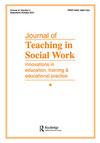Simulation-Based Learning in School Social Work Education: Developing MSW Competencies in a Holistic, Engaging, and Experiential Approach
IF 0.9
Q3 EDUCATION & EDUCATIONAL RESEARCH
引用次数: 0
Abstract
ABSTRACTThis article presents the use of simulation-based learning (SBL) for master-level school social work students at a public university in the Midwest. Findings based on the use of four school-specific case scenarios and subsequent focus group discussions suggest that live simulations can serve as a model to engage students by presenting curricula in a relevant and experiential fashion. SBL supported the creation of new meaning and understanding of school social work practice that students will eventually integrate into their own practice. Findings support the integration of simulations in the classroom as an effective pedagogical approach for school social work instruction.KEYWORDS: Simulation-based learningschool social workinstructionsocial work skills and competenciesvalues and ethics AcknowledgmentsWe thank all students who participated in this evaluation study. Additionally, we thank Tony Hillen for the technical assistance provided for the simulation laboratories and all the doctoral students who supported the simulation laboratories. We acknowledge the actors and actresses from The Station Theatre who provided their time and professional services for enacting the scenarios in the simulation laboratories. Lastly, we thank the faculty and staff at the Illinois Solar Decathlon House for their help with organizing the labs. The simulation lab activities were supported by a grant from the University of Illinois Provost’s Initiative on Teaching Advancement.Disclosure statementNo potential conflict of interest was reported by the author(s).学校社会工作教育中基于模拟的学习:以整体、参与和体验的方式发展城市生活垃圾能力
基于使用四个学校特定案例场景和随后的焦点小组讨论的结果表明,现场模拟可以作为一种模型,通过以相关和体验的方式展示课程来吸引学生。SBL支持学生对学校社会工作实践创造新的意义和理解,并最终将其融入自己的实践中。研究结果支持将模拟融入课堂作为学校社会工作教学的有效方法。关键词:模拟学习学校社会工作指导社会工作技能和能力价值观和道德感谢所有参与本次评估研究的学生。此外,我们感谢Tony Hillen为模拟实验室提供的技术支持以及所有支持模拟实验室的博士生。我们感谢来自车站剧院的演员,他们为模拟实验室的场景提供了时间和专业服务。最后,我们感谢伊利诺伊州太阳能十项全能之家的教职员工在组织实验室方面的帮助。模拟实验室的活动得到了伊利诺伊大学教务长教学进步倡议的资助。披露声明作者未报告潜在的利益冲突。
本文章由计算机程序翻译,如有差异,请以英文原文为准。
求助全文
约1分钟内获得全文
求助全文
来源期刊

Journal of Teaching in Social Work
EDUCATION & EDUCATIONAL RESEARCH-
CiteScore
1.20
自引率
0.00%
发文量
36
期刊介绍:
The Journal of Teaching in Social Work fills a long-standing gap in the social work literature by providing opportunities for creative and able teachers—in schools, agency-based training programs, and direct practice—to share with their colleagues what experience and systematic study has taught them about successful teaching. Through articles focusing on the teacher, the teaching process, and new contexts of teaching, the journal is an essential forum for teaching and learning processes and the factors affecting their quality. The journal recognizes that all social work practitioners who wish to teach (whatever their specialty) should know the philosophies of teaching and learning as well as educational methods and techniques.
 求助内容:
求助内容: 应助结果提醒方式:
应助结果提醒方式:


